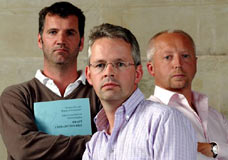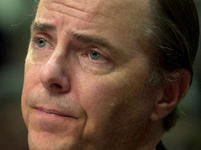 Cato’s Julian Sanchez brilliantly sums up the logic behind the national security policy that leads our government to impose this kind of absurd abuse on its citizens:
Cato’s Julian Sanchez brilliantly sums up the logic behind the national security policy that leads our government to impose this kind of absurd abuse on its citizens:
Batman’s archnemesis the Joker–played memorably by Heath Ledger in 2008‚Ä≤s blockbuster The Dark Knight–might seem like an improbable font of political wisdom, but it’s lately occurred to me that one of his more memorable lines from the film is surprisingly relevant to our national security policy:
“You know what I’ve noticed? Nobody panics when things go ‘according to plan.’ Even if the plan is horrifying! If, tomorrow, I tell the press that, like, a gang banger will get shot, or a truckload of soldiers will be blown up, nobody panics, because it’s all ‘part of the plan.'”
There are, one hopes, limits. The latest in a string of videos from airport security to provoke online outrage shows a six-year-old girl being subjected to an invasive Transportation Security Administration pat down–including an agent feeling around in the waistband of the girl’s pants. I’m somewhat reassured that people don’t appear to be greatly mollified by TSA’s response:
“A video taken of one of our officers patting down a six year-old has attracted quite a bit of attention. Some folks are asking if the proper procedures were followed. Yes. TSA has reviewed the incident and the security officer in the video followed the current standard operating procedures.”
While I suppose it would be disturbing if individual agents were just improvising groping protocol on the fly (so to speak), the response suggests that TSA thinks our concerns should be assuaged once we’ve been reassured that everything is being done by the book–even if the book is horrifying. But in a sense, that’s the underlying idea behind all security theater: Show people that there’s a Plan, that procedures are in place, whether or not there’s any good evidence that the Plan actually makes us safer.
And this is not all about civil liberties, either. As David Henderson points out, citizens who throw up their hands in disgust with the TSA’s security theater and elect to drive rather than take a short-haul flight risk a fatality rate that is 80 times higher per mile than travelers on a commercial airliner face.
In short, the TSA is killing people.
As with the overcriminalization of American life, the TSA is an ominous reflection of a federal government and major political parties that are increasingly remote and unresponsive to citizens.
Is it too late to change? That would be a good question for someone to ask President Obama, who was famously elected on the slogan of “change we can believe in.”

 That’s essentially the question that
That’s essentially the question that 
 Glenn Greenwald has done an outstanding job of directing the blogosphere’s attention toward the U.S. Army’s
Glenn Greenwald has done an outstanding job of directing the blogosphere’s attention toward the U.S. Army’s 



